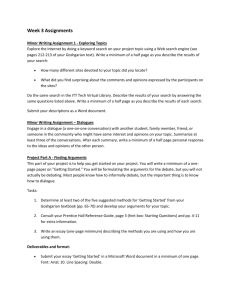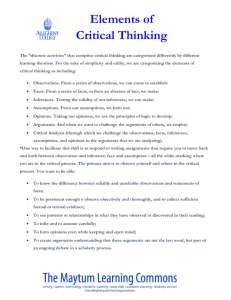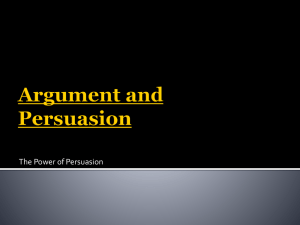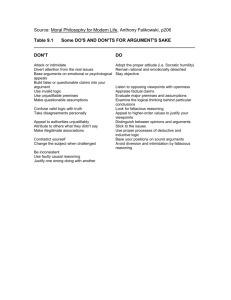University of Wisconsin-Stevens Point: Teaching Critical Thinking Across the Curriculum
advertisement
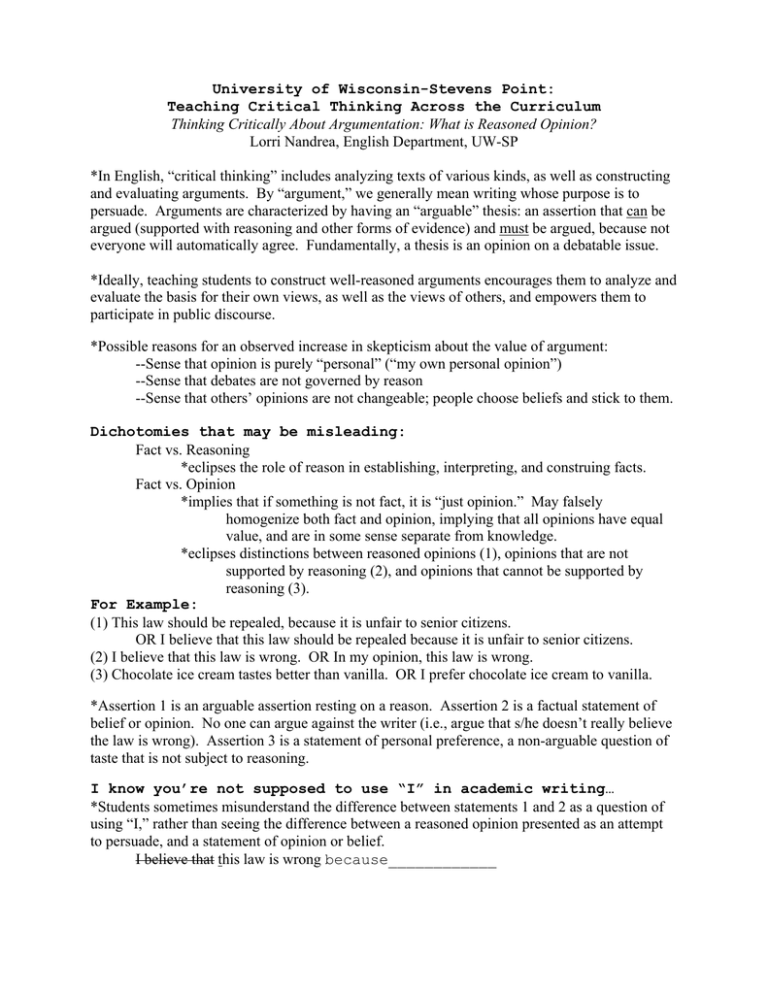
University of Wisconsin-Stevens Point: Teaching Critical Thinking Across the Curriculum Thinking Critically About Argumentation: What is Reasoned Opinion? Lorri Nandrea, English Department, UW-SP *In English, “critical thinking” includes analyzing texts of various kinds, as well as constructing and evaluating arguments. By “argument,” we generally mean writing whose purpose is to persuade. Arguments are characterized by having an “arguable” thesis: an assertion that can be argued (supported with reasoning and other forms of evidence) and must be argued, because not everyone will automatically agree. Fundamentally, a thesis is an opinion on a debatable issue. *Ideally, teaching students to construct well-reasoned arguments encourages them to analyze and evaluate the basis for their own views, as well as the views of others, and empowers them to participate in public discourse. *Possible reasons for an observed increase in skepticism about the value of argument: --Sense that opinion is purely “personal” (“my own personal opinion”) --Sense that debates are not governed by reason --Sense that others’ opinions are not changeable; people choose beliefs and stick to them. Dichotomies that may be misleading: Fact vs. Reasoning *eclipses the role of reason in establishing, interpreting, and construing facts. Fact vs. Opinion *implies that if something is not fact, it is “just opinion.” May falsely homogenize both fact and opinion, implying that all opinions have equal value, and are in some sense separate from knowledge. *eclipses distinctions between reasoned opinions (1), opinions that are not supported by reasoning (2), and opinions that cannot be supported by reasoning (3). For Example: (1) This law should be repealed, because it is unfair to senior citizens. OR I believe that this law should be repealed because it is unfair to senior citizens. (2) I believe that this law is wrong. OR In my opinion, this law is wrong. (3) Chocolate ice cream tastes better than vanilla. OR I prefer chocolate ice cream to vanilla. *Assertion 1 is an arguable assertion resting on a reason. Assertion 2 is a factual statement of belief or opinion. No one can argue against the writer (i.e., argue that s/he doesn’t really believe the law is wrong). Assertion 3 is a statement of personal preference, a non-arguable question of taste that is not subject to reasoning. I know you’re not supposed to use “I” in academic writing… *Students sometimes misunderstand the difference between statements 1 and 2 as a question of using “I,” rather than seeing the difference between a reasoned opinion presented as an attempt to persuade, and a statement of opinion or belief. I believe that this law is wrong because____________ You like chocolate; I like vanilla. You like that law; I think it’s wrong. ☺ *Values on tolerance, diversity, and politeness may lead to the sense that all assertions of opinion must be treated as equally plausible (especially within a college classroom). The same factors can make it difficult for faculty to maintain that distinctions of cogency, plausibility, persuasiveness, and relevance can be made among opinions. *The risk is conflating questions of personal taste (preference is all that matters) with questions of public debate, communal decision-making, or choice of viewpoint (arrived at through a process of reasoning, weighing evidence, comparing arguments on different sides). We want to know what you think! Your opinions matter to us! *The ubiquity of polls and surveys may overvalue having an opinion, per se, as opposed to the reasons for holding the opinion, the ability to communicate those reasons, or a willingness to change one’s opinion if new, more compelling arguments emerge. “Your opinion counts”: It doesn’t matter how much you know about the issue, as long as you have beliefs and views. I believe that this law is wrong because that is my opinion. --Stress the idea of audience (writing for an audience of strangers) It’s all relative. Anything is possible. That may be true for him. *Unfortunately, the postmodern idea that there is no standard of absolute truth by which to measure opinions or beliefs independent of context may have encouraged a pluralism that takes the form of reluctance to judge opinions, no matter how outrageous and unreasonable. --Stress can be placed on criteria such as pertinence, rigor, and consequences. A Few Thoughts on Assignments --Having students read several arguments that espouse the same position with differing degrees of plausibility may be helpful in leading them to evaluate the reasoning rather than the position itself. --Having students read very well constructed arguments espousing a variety of positions on an issue can be helpful in leading them to see the power of sound reasoning to change people’s minds. --Linking writing assignments to readings that provide significant background knowledge on the issue helps students see the value of informing themselves before taking a position. It may be helpful to choose an issue that is not polarized, so students can see nuances and complexities amid a spectrum of possibilities. Reading and writing about a real world debate on which an impending decision depends may help students see the value of argument in the public sphere. Greenwood Press’s “Opposing Viewpoints” series may be useful for such assignments. Resources Schick, Theodore and Lewis Vaughn. How to Think About Weird Things: Critical Thinking for a New Age. Boston: McGraw Hill, 2003. [new edition 2007] Vaughn, Lewis. The Power of Critical Thinking. New York: Oxford UP, 2005. Willingham, Daniel T. “Critical Thinking: Why is it So Hard to Teach?” American Educator (Summer 2007): 8-19. de Zengotita, Thomas, “Believing Whatever.” Chronicle of Higher Education 11 Nov. 2005: B13-14.
